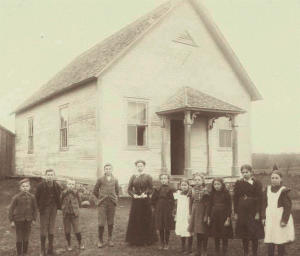Le modèle de l’école est-il vraiment à repenser? Après tout, pourquoi repenser un modèle qui fonctionne relativement bien? Pour Shawn McCusker, leader en éducation et formateur pour la compagnie de développement professionnel EdTechTeacher, la raison provient principalement de la relation que nous avons avec l’information. À ce sujet, il signe l’article Teaching in the New (Abundant) Economy of Information sur le site MindShift. Voici un résumé de ses propos.
Historiquement, l’enseignant était un maître dans l’art de trouver de l’information et de la transmettre à ses élèves. L’école et l’enseignant étaient donc la source du contenu pour l’élève. Avec l’arrivée du Web et des appareils mobiles, l’accès à la connaissance a complètement changé.
Enseigner dans un environnement de rareté
Le modèle scolaire actuel a été mis en place à une époque où l’information était rare. Le savoir était détenu par l’enseignant, dans les quelques livres qu’il possédait et dans les rares bibliothèques. On peut facilement imaginer les premières écoles de rang au Québec au début du 19e siècle. Pendant plus de 150 ans, ces petites écoles ont permis aux enfants de la campagne d’obtenir les connaissances nécessaires dans les matières de base (français, mathématiques, histoire, géographie). Ces enfants n’avaient pas accès à la connaissance à l’extérieur de ce petit bâtiment en bois. Certains privilégiés pouvaient aspirer à se déplacer en ville pour des études classiques qui menaient vers les professions libérales ou ecclésiastique.

Il y a une vingtaine d’années, la majorité des écoles n’avait pas de laboratoire informatique. Pour que les élèves puissent faire une recherche, ils devaient aller à la bibliothèque et trouver des livres qui parlaient de leur sujet. Des livres hautement intéressants, mais qui quelques fois étaient dépassés puisque le domaine avait évolué.
À cette époque de rareté, l’enseignant devait avoir en banque une monnaie hautement importante : le temps! C’est avec beaucoup de temps qu’il pouvait chercher et rassembler une rareté d’information et la présenter à ses élèves. C’était l’époque de l’âge d’or de l’enseignement centré sur l’enseignant.
La nouvelle économie de l’abondance
Aujourd’hui, la quantité d’information disponible au bout des doigts est vertigineuse. La compagnie Google s’est donnée comme mission d’organiser cette information. En 2012, elle a indexé dans ses serveurs plus de 30 000 milliards de documents. Ces documents sont-ils tous pertinents? Il est évident que non. Par contre, Internet est rempli de centaines de sources fiables et vraiment sérieuses. Un enseignant qui veut continuer à présenter sa matière de façon magistrale le fait en compétition directe avec cette manne d’information, qui autrement est une opportunité de rendre les élèves actifs plutôt que passifs.
Pour terminer, l’auteur voit le nouveau rôle de l’enseignant en lien avec cette information. Selon lui, l’enseignant doit devenir un chef analyste, un coach de la validation, un assistant de recherche, un maître de la différenciation et un créateur d’expériences d’apprentissage partagées. N’est-ce pas intéressant?






